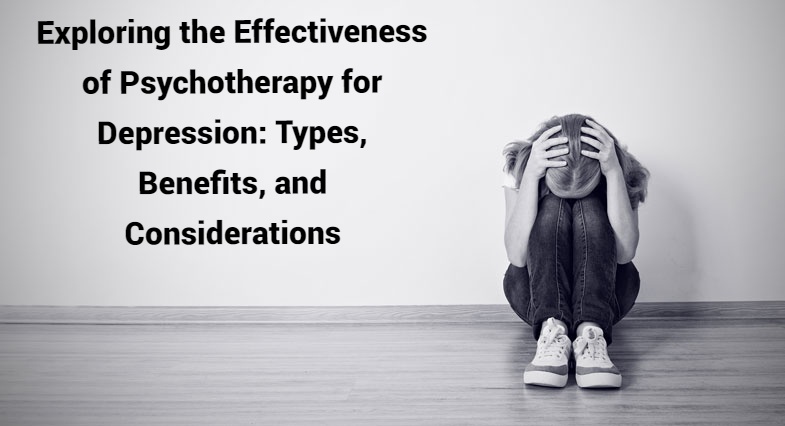Depression is a mental health condition that affects millions of people worldwide. It can be a debilitating condition that affects every aspect of a person's life, including their work, relationships, and overall well-being. Psychotherapy has been used for decades as a treatment option for depression. This article will explore the effectiveness of psychotherapy for depression and the various types of psychotherapy available.
What is Psychotherapy?
Psychotherapy is a type of mental health treatment that involves talking with a mental health professional. It is also referred to as talk therapy or counseling. The goal of psychotherapy is to help individuals understand and cope with their mental health conditions better. Psychotherapy can be conducted in a one-on-one setting or in a group setting.
Effectiveness of Psychotherapy for Depression
Studies have shown that psychotherapy is an effective treatment option for depression. The American Psychological Association (APA) recommends psychotherapy as a first-line treatment for mild to moderate depression. In severe cases, medication may be necessary in addition to psychotherapy.
Psychotherapy helps individuals with depression by addressing negative thoughts and behaviors. It can also help individuals develop coping skills to manage their symptoms better. Psychotherapy can be beneficial for individuals with depression who do not want to take medication or who have not responded well to medication.
Types of Psychotherapy for Depression
There are several types of psychotherapy available for individuals with depression. The following are some of the most common types of psychotherapy used for depression.
Cognitive Behavioral Therapy (CBT)
Cognitive Behavioral Therapy (CBT) is a type of psychotherapy that focuses on changing negative thoughts and behaviors. CBT is a short-term treatment that can be completed in 12-16 sessions. The goal of CBT is to help individuals develop coping skills to manage their symptoms better. CBT has been shown to be an effective treatment option for depression.
Interpersonal Therapy (IPT)
Interpersonal Therapy (IPT) is a type of psychotherapy that focuses on improving communication and relationship skills. The goal of IPT is to help individuals with depression improve their interpersonal relationships. IPT can be beneficial for individuals with depression who are experiencing relationship problems or who have experienced a significant life change, such as a divorce or the death of a loved one.
Psychodynamic Therapy
Psychodynamic Therapy is a type of psychotherapy that focuses on understanding how past experiences and emotions impact current thoughts and behaviors. The goal of psychodynamic therapy is to help individuals with depression develop insight into their thoughts and behaviors. Psychodynamic therapy can be a long-term treatment option and may require weekly or bi-weekly sessions.
Mindfulness-Based Cognitive Therapy (MBCT)
Mindfulness-Based Cognitive Therapy (MBCT) is a type of psychotherapy that combines cognitive-behavioral therapy with mindfulness techniques. The goal of MBCT is to help individuals with depression develop mindfulness skills to manage their symptoms better. MBCT has been shown to be an effective treatment option for individuals with a history of recurrent depression.
Benefits of Psychotherapy for Depression
Psychotherapy has several benefits for individuals with depression. The following are some of the most significant benefits of psychotherapy for depression.
Improved Mood
Psychotherapy can help individuals with depression improve their mood by addressing negative thoughts and behaviors. By developing coping skills to manage their symptoms better, individuals with depression can experience improved mood and a better quality of life.
Improved Relationships
Psychotherapy can help individuals with depression improve their interpersonal relationships. By addressing communication issues and improving relationship skills, individuals with depression can improve their relationships with family and friends.
Reduced Relapse Rates
Studies have shown that individuals who receive psychotherapy for depression have a lower risk of relapse. Psychotherapy can help individuals develop coping skills to manage their symptoms better, reducing the risk of relapse.
In conclusion, psychotherapy is a highly effective treatment option for individuals with depression. It can help individuals improve their mood, develop coping skills, and improve their interpersonal relationships. There are several types of psychotherapy available, including CBT, IPT, psychodynamic therapy, and MBCT. Each type of psychotherapy has its unique approach and benefits, and individuals with depression may benefit from a combination of different types of psychotherapy. Psychotherapy has been shown to reduce the risk of relapse and can be a helpful treatment option for individuals who do not want to take medication or who have not responded well to medication. If you are struggling with depression, consider reaching out to a mental health professional therapists in Oakville to discuss psychotherapy as a treatment option.


No comments yet